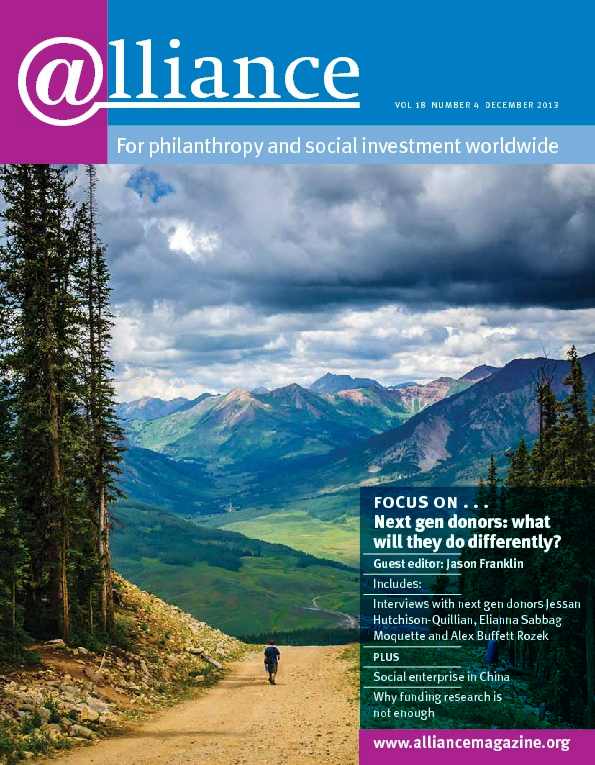Philanthropy seems to be the buzzword in South Africa at the moment. It has always happened, but over the last decade it seems to have gained in prominence across cultures and income groups. Its definition has also broadened: traditionally seen as the benevolence of the rich to address the ills of the poor and marginalized, philanthropy is now considered as embracing everything from traditional private philanthropic models such as family trusts and foundations, wealthy people who give on an ad hoc basis, and giving by newly wealthy people arising from family and community responsibility (which often supports entire communities) to social entrepreneurship and impact investing.
I am not sure that I fit into the category of old generation or next as I have just turned 40; perhaps current generation would be a better definition. But I grapple with this ‘new’ view of philanthropy.
As coordinator of a network of fellow philanthropists of all ages through Inyathelo’s Private Philanthropy Circle of South Africa,[1] I have noticed some desire among new generation philanthropists to give up old practices and embrace new ideologies and systems. As they move into active roles in family foundations, they are eager to steer the foundations towards newer models such as impact investing, social enterprise support and soft loans. Younger philanthropists also tend to be very focused on outcomes and returns on investments based on intensive monitoring and evaluation. There is nothing wrong with this in principle, but the big question is who will do it and who will cover the cost.
In family foundations, this new wave seems still to be tempered by the presence of older generations who are interested purely in social returns and base their giving on relationships cultivated sometimes over decades. This relationship building is often lost among the younger generations, yet it allows for an understanding of the human element in the equation, which in turn allows for resilience. In their pursuit of newer, so-called innovative models of philanthropy, there is an underlying belief that business can save the world. In my opinion, this is simply not the case.
As is always the case, areas of interest differ from generation to generation. At the moment, there is a strong movement towards activism and active involvement. Young philanthropists are, after all, young South African citizens, many of whom are angry and disillusioned by what democracy has not delivered. These givers want to express that through support of social justice initiatives. Currently, our young members are very keen on addressing issues in the education sector, which includes the social justice aspects of education as well as new and innovative models like low-fee private schools that run like a business. Moreover, they don’t want to be cheque-book givers, they want to be actively involved in the organizations they support – with both positive and negative repercussions.
What is also clear from our group is that young givers want to learn from their peers and to share their knowledge. The Private Philanthropy Circle was convened in response to a call from the current and new generations to bring together local foundations and philanthropists in a loose network. Philanthropists are by nature private and tend to operate in silos. When the Circle first formed, there was little or no collaboration between philanthropists, despite there being significant alignment among them in terms of both their objectives and the sectors they wanted to support. Giving was discussed behind closed doors and was often anonymous. Peer-to-peer discussions around what individuals were doing were almost non-existent. It was almost impossible for potential beneficiaries to find the givers let alone build a relationship with them.
Over the last three years there has been, along with the peer learning and the comfort of an open forum for transparent private dialogue, a great deal of collaboration and partnership. Largely driven by the new generation, this in turn has delivered some innovative solutions, with results that were not previously possible.
Stakeholder engagement, peer learning, knowledge sharing, collaboration, active involvement, embracing new opportunities, avenues and models; these are all qualities that in my opinion define the next generation of philanthropists.
1 The Circle includes private philanthropists of all ages. Membership is not open to corporate foundations or foundations created through other institutions and organizations.
Amanda Bloch is a philanthropy consultant to Inyathelo: The South African Institute for Advancement and a member and coordinator of the Private Philanthropy Circle. Email Amanda@inyathelo.co.za
For more information
http://www.inyathelo.org.za/the-private-philanthropy-circle.html


Comments (0)